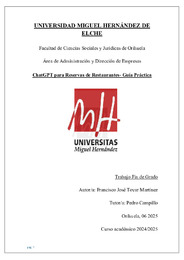Por favor, use este identificador para citar o enlazar este ítem:
https://hdl.handle.net/11000/36977Registro completo de metadatos
| Campo DC | Valor | Lengua/Idioma |
|---|---|---|
| dc.contributor.advisor | Campillo Herrero, Pedro | - |
| dc.contributor.author | Tovar Martínez, Francisco José | - |
| dc.contributor.other | Departamentos de la UMH::Estadística, Matemáticas e Informática | es_ES |
| dc.date.accessioned | 2025-07-28T11:17:13Z | - |
| dc.date.available | 2025-07-28T11:17:13Z | - |
| dc.date.created | 2025-06 | - |
| dc.identifier.uri | https://hdl.handle.net/11000/36977 | - |
| dc.description.abstract | El presente Trabajo de Fin de Grado (TFG) aborda el desarrollo de una guía práctica y exhaustiva que sirva como manual para la creación e implementación de un agente de IA basado en ChatGPT, específicamente diseñado para la gestión de reservas de mesas en restaurantes. Para alcanzar este objetivo, se ha realizado una revisión del estado del arte sobre la IA en la hostelería y los sistemas de reserva, seguido del diseño conceptual del agente. El núcleo del trabajo se centra en la guía de implementación, detallando la configuración inicial, la interacción con la API de ChatGPT, la ingeniería de prompts, la gestión del diálogo y la crucial integración con sistemas externos mediante la funcionalidad de function calling. Finalmente, se analizan los desafíos técnicos, operativos y éticos inherentes, y se exponen las conclusiones del estudio, reconociendo la viabilidad de la solución propuesta y su potencial para optimizar operaciones y mejorar la satisfacción del cliente, al tiempo que se identifican limitaciones y se proponen futuras líneas de investigación. | es_ES |
| dc.description.abstract | This Final Degree Project (TFG) addresses the development of a comprehensive and practical guide to serve as a manual for the creation and implementation of a ChatGPTbased AI agent, specifically designed for managing restaurant table reservations. To achieve this objective, a state-of-the-art review of AI in the hospitality industry and reservation systems was conducted, followed by the agent's conceptual design. The core of the project focuses on the implementation guide, detailing the initial setup, interaction with the ChatGPT API, prompt engineering, dialogue management, and the crucial integration with external systems using the function calling feature. Finally, the inherent technical, operational, and ethical challenges are analyzed, and the study's conclusions are presented, acknowledging the viability of the proposed solution and its potential to optimize operations and improve customer satisfaction, while also identifying limitations and proposing future lines of research. | es_ES |
| dc.format | application/pdf | es_ES |
| dc.format.extent | 53 | es_ES |
| dc.language.iso | spa | es_ES |
| dc.publisher | Universidad Miguel Hernández de Elche | es_ES |
| dc.rights | info:eu-repo/semantics/openAccess | es_ES |
| dc.rights | Attribution-NonCommercial-NoDerivatives 4.0 Internacional | * |
| dc.rights.uri | http://creativecommons.org/licenses/by-nc-nd/4.0/ | * |
| dc.subject | Inteligencia Artificial | es_ES |
| dc.subject | ChatGPT | es_ES |
| dc.subject | Reservas de Restaurantes | es_ES |
| dc.subject | Function Calling | es_ES |
| dc.title | ChatGTP para reservas de restaurantes - Guía Práctica | es_ES |
| dc.type | info:eu-repo/semantics/bachelorThesis | es_ES |

Ver/Abrir:
TFG Tovar Martinez, Francisco Jose.pdf
6,3 MB
Adobe PDF
Compartir:
 La licencia se describe como: Atribución-NonComercial-NoDerivada 4.0 Internacional.
La licencia se describe como: Atribución-NonComercial-NoDerivada 4.0 Internacional.
.png)